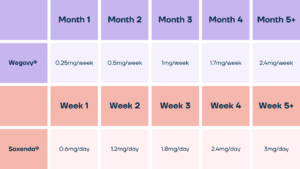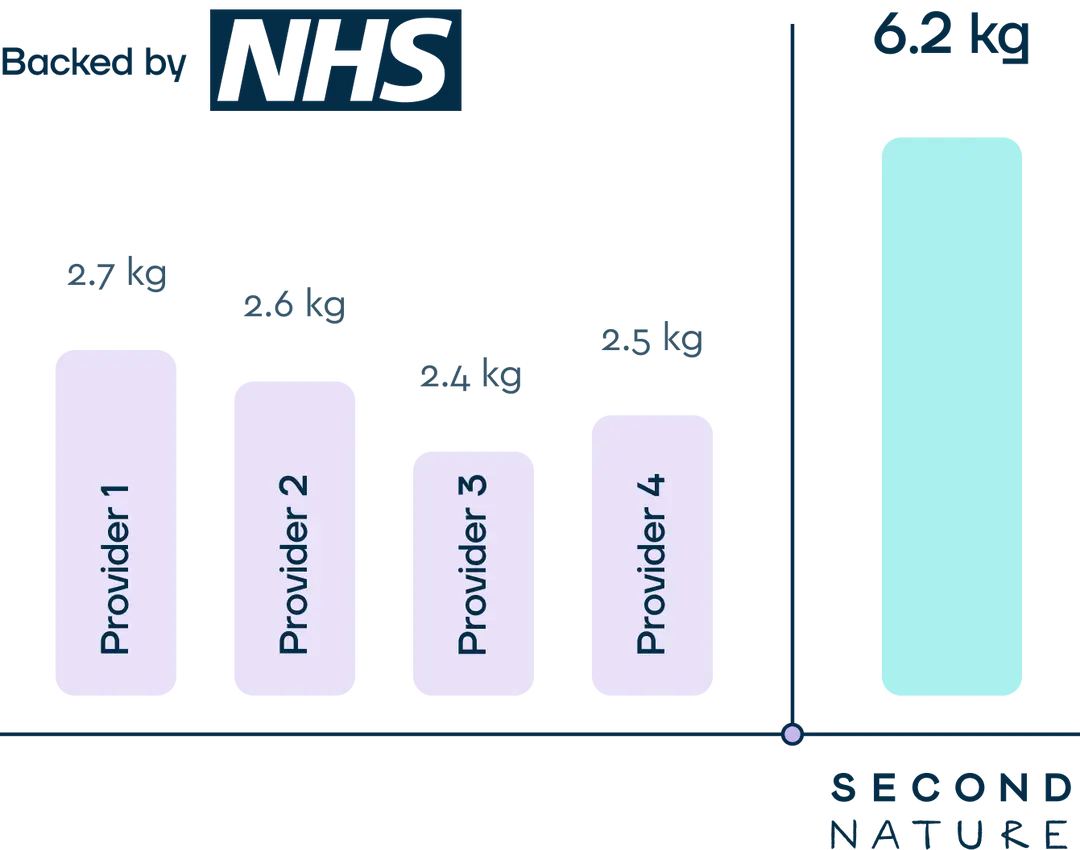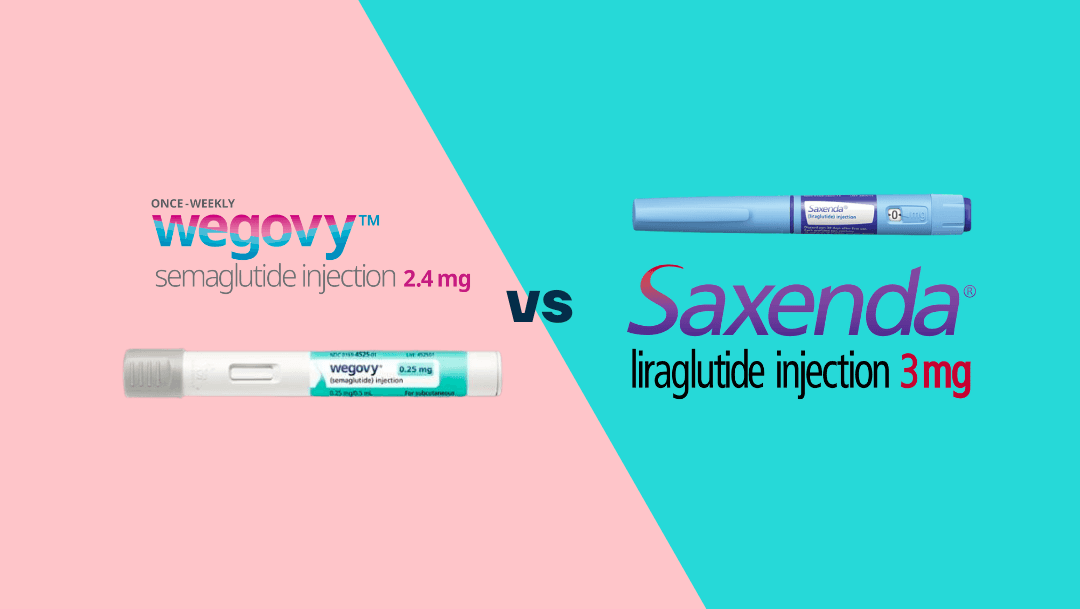Jump to: What are Wegovy and Saxenda? | Do you lose more weight on Wegovy or Saxenda? | Should I buy Wegovy or Saxenda? | Take home message
Wegovy and Saxenda are GLP-1 receptor agonists, a class of medications from the pharmaceutical company Novo Nordisk that reduce appetite to support weight loss.
The active ingredient in Wegovy is semaglutide, and liraglutide in Saxenda. GLP-1 receptor agonists improve insulin function to lower blood sugar levels and delay gastric emptying, decreasing appetite.
According to data from randomised controlled trials, Wegovy seems to be more effective than Saxenda for weight loss and blood sugar improvements.
Studies have also shown that Wegovy leads to fewer side effects and adverse events than Saxenda, with people tolerating Wegovy better.
So, if you’re looking for a GLP-1 receptor agonist to help you lose weight and improve your blood sugar levels, Wegovy is likely the better option.
However, individual responses to medications vary between individuals. Be mindful of side effects and contact your healthcare team to determine the appropriate medication and dosage.
Wegovy and Saxenda are approved for individuals living with obesity to help them eat fewer calories and lose weight.
Still, you’ll also experience improved glycemic control due to the effect of GLP-1s on insulin function.
Wegovy and Saxenda are available via the NHS (as part of tier 3 weight management programmes) and private prescription in the UK.
One of the main differences between Wegovy and Saxenda is the dosing schedule.
Both drugs are self-administered injections, but Wegovy is administered once a week and Saxenda once a day.
Wegovy and Saxenda dosing schedules:

Not a magic pill
These medications are designed as additional tools for weight management interventions and shouldn’t be considered lifelong medications.
Instead, they should be used to help you kickstart your weight loss and healthy journey while you commit to living a healthier lifestyle.
At Second Nature, we’ve been trusted by the NHS in the UK since 2017 to support people with type 2 diabetes and obesity to lose weight, manage their blood sugar levels, and lead healthier lifestyles for the long term.
If you’re considering purchasing Wegovy® or Saxenda® but need support in making positive changes to your lifestyle, Second Nature could be an option for you.
In 2022, the NHS published data in the BMJ that compared the weight loss outcomes of five providers in the National Diabetes Prevention Programme.
Second Nature was more than twice as effective at supporting weight loss than the other four providers.

1) What are Wegovy and Saxenda?
When we eat food, our stomach releases a hormone that helps the body regulate hunger and blood sugar levels. This hormone is called GLP-1 (glucagon-like peptide-1). The actions of GLP-1 are the target of Wegovy and Saxenda.
This class of medications are known as GLP-1 receptor agonists (GLP-1s). They mimic the actions of the hormone GLP-1.
GLP-1s help your pancreas release more insulin to lower blood sugar levels, delay emptying food from the stomach (also called gastric emptying), and reduce appetite via a mechanism in the brain.
There are two well-known GLP-1 medications available in the UK:
- Liraglutide (Saxenda): Taken once a day.
- Semaglutide (Wegovy and Ozempic): Taken once a week.
Do GLP-1 receptor agonists work?
Clinical trials have demonstrated that GLP-1s are more effective at weight loss than other weight loss medication drugs like orlistat, which has a different mode of action for weight loss and lowering BMI (body mass index).
A systematic review and meta-analysis (a study analysing lots of different studies) analysed 28 trials in over 29,000 people investigating the effectiveness of five weight loss medications on weight loss.
The study found that all five medications were more effective than the placebo at supporting weight loss.
This trial included orlistat and the GLP-1 liraglutide and found that liraglutide was more effective at weight loss than orlistat and showed that participants taking liraglutide were twice as likely to achieve more than 5% weight loss than orlistat.
Due to the relationship between obesity, blood sugar levels, and cardiovascular disease, research shows a positive relationship between GLP-1s and heart disease risk factors such as high blood pressure (hypertension) and triglyceride levels.
Interestingly, more recent studies have shown that semaglutide (Wegovy and Ozempic) is more effective at supporting weight loss and type 2 diabetes than liraglutide (Saxenda).
It’s not recommended for pregnant women or individuals with a family history of thyroid cancer to take GLP-1s.
Key points:
- GLP-1 receptor agonists (GLP-1s) are a class of medications that mimic the actions of the hormone GLP-1, which helps regulate hunger and blood sugar levels
- GLP-1s help the pancreas release more insulin, delay stomach emptying, and reduce appetite
- Two well-known GLP-1 medications in the UL are liraglutide (Saxenda) and semaglutide (Wegovy and Ozempic)
- Research has suggested that GLP-1s are more effective at supporting weight loss than other weight loss medication drugs like orlistat
- A systematic review and meta-analysis found that all five weight loss medications investigated were more effective than placebo at supporting weight loss
- Liraglutide was more effective at weight loss than orlistat. Semaglutide is more effective at supporting weight loss and type 2 diabetes than liraglutide
2) Do you lose more weight on Wegovy or Saxenda?
Research suggests that Wegovy is a more effective weight-loss injection than Saxenda. It also appears to be better tolerated with fewer adverse events and side effects.
A randomised controlled trial was conducted in 2022 investigating the impact of semaglutide and liraglutide on weight loss in individuals living with obesity.
The results showed that the participants in the semaglutide group lost 15.8% of their body weight compared to 6.4% in the liraglutide group.
So, participants on Wegovy lost nearly 10% more weight on average than those on Saxenda.
Semaglutide was also shown to be more tolerated than liraglutide. 13.5% of participants in the semaglutide group discontinued their treatment due to side effects, compared to 27.6% with liraglutide.
Over 80% of participants in both groups reported common side effects and GI-related issues such as constipation, cramping, bloating, and diarrhoea.
Due to the positive results from these studies, semaglutide approved for weight loss in the UK in 2023.
Key points:
- A meta-analysis compared the impact of semaglutide (Wegovy®) and liraglutide (Saxenda) on lowering blood sugar levels (measured by HbA1c) and suggested that semaglutide was more effective than liraglutide
- A randomised controlled trial conducted in 2022 investigated the impact of semaglutide and liraglutide on weight loss in individuals living with obesity
- The results showed that semaglutide was more effective at weight loss (15.8% body weight loss) than liraglutide (6.4% body weight loss)
- Semaglutide was also better tolerated than liraglutide, with fewer participants discontinuing treatment due to side effects, but GI-related issues were common in both groups
3) Should I buy Wegovy or Saxenda?
Effectiveness
Wegovy is generally a more effective drug than Saxenda. As demonstrated above, semaglutide (the active ingredient in Wegovy) leads to more clinically significant weight loss and blood sugar reductions than liraglutide (the active ingredient in Saxenda).
So, if you were looking at trying GLP-1 medications for weight loss or blood sugar improvements, Wegovy could be the better choice.
Side effects and safety
Wegovy seems to be a better-tolerated drug than Saxenda. As discussed above, in a randomised controlled trial comparing the two, 50% more people discontinued their treatment due to the side effects of Saxenda compared to Wegovy.
Still, over 80% of individuals taking both medications can expect to experience severe and mild side effects like nausea, constipation, and cramping.
However, the discomfort from these side effects appears greater with Saxenda than with Wegovy.
Individual responses to medications vary significantly. Some people might do well on Saxenda but not on Wegovy (and vice-versa).
It’s essential to weigh the pros and cons of your medication and report any side effects to your healthcare team.
Cost
Saxenda cost
The cost depends on where you’re purchasing it from and how long you intend to use the medication.
However, to purchase Saxenda and injectable pens required for 56 days would cost £323.99, or around £160 per month.
The price would then increase incrementally the longer you use the medication. Saxenda is generally recommended for up to 12 weeks, costing anywhere between £485-£540.
Saxenda is available on prescription in UK pharmacies if you’re eligible.
Wegovy
To purchase Wegovy and the injectable pens required for four weeks of treatment costs £229 per month with Second Nature.
£229 includes the support of a registered dietitian or nutritionist to support you in making healthy changes to keep the weight off for good.
The cost for Wegovy will then rise to £299 after 3 months.
If you’re looking to purchase Wegovy elsewhere, the cost can range from £190 to £400 per month.
Key points:
- Wegovy is more effective than Saxenda at supporting weight loss and blood sugar reductions
- Wegovy seems to lead to fewer side effects and is better tolerated than Saxenda
- However, individuals will vary in their response to medications, so choose the right one for you
Wegovy and Saxenda are both available on prescription in the UK if you’re eligible- Both medications are expensive if you opt to purchase them privately
Take home message
The recent innovations in GLP-1 medications are pretty remarkable and have caused quite a stir in the world of healthcare.
We’re in new territory where obesity and type 2 diabetes medications treat an underlying cause instead of merely treating the symptoms to support better management.
However, these drugs shouldn’t be seen as miracle cures; they’re not designed to be used for life.
They’ve been designed to be taken alongside lifestyle changes that will enable you to eventually come off the medications and maintain your lower weight for the long term.
The harsh reality is that we still don’t know the long-term effects of these medications on our health. There are examples of drugs being withdrawn from the market as more long-term data comes to light.
Lorcaserin was a weight loss drug approved by the Food and Drug Administration (FDA) in the U.S. but was recently withdrawn as data indicated that it increased cancer risk.
The example of lorcaserin is why you must weigh the pros and cons when your doctor prescribes medication or before you purchase it yourself and start treatment. Report any side effects to your healthcare team.
GLP-1s are safe and effective for most people in the short to medium term, but we don’t have long-term data to be sure they’re not causing severe adverse effects elsewhere.
At Second Nature, we’re not against using medications to support people in making healthy changes and reducing their risk of chronic disease.
However, we don’t recommend using medications as a reason not to make healthy lifestyle changes. The causes of obesity and type 2 diabetes aren’t merely rooted in biology but also in psychology and sociology.
With these medications, you may lose weight and reduce blood sugar levels. But will you be happier? Will you be more fulfilled? Will you be content with your life and social relationships?
For that, you may need to consider a lifestyle change.


